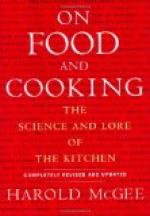Yeast is a collection of living organisms or plants belonging to the family of fungi, which, like all other plants, require warmth, moisture, and food, in order to promote growth, and when properly supplied with these, they begin to grow and multiply rapidly. Fermentation will not take place at a temperature below 30 deg., it proceeds slowly at 45 deg., but from 70 deg. to 90 deg. it goes on rapidly. Fermentation may be arrested by the exhaustion of either the fermenting agent or the food supply, or by exposure to heat at the temperature of boiling water. This latter fact enables the housewife to arrest the process of fermentation, when the loaf has become sufficiently light, by baking it in a hot oven. Heat destroys most of the yeast cells; a few, however, remain in the loaf unchanged, and it is for this reason that yeast bread is considered less wholesome for dyspeptics than light unleavened bread. It is apparent, then, that the more thoroughly fermented bread is baked, the more wholesome it will be, from the more complete destruction of the yeast germs which it contains.
YEAST.—Next to good flour, the most important requisite in the manufacture of fermented bread is good yeast. The best of flour used in conjunction with poor yeast will not produce good bread. The most convenient and reliable kind of marketable yeast, when fresh, is the compressed yeast. The dry though they are always ready for use, the quality of the bread they produce is generally inferior to that made with either compressed yeast or good liquid yeast. If this sort of yeast must be depended upon, the cakes known as “Yeast Foam” are the best of any with which we are acquainted.
Of homemade yeasts there are almost as many varieties as there are cooks. Their comparative value depends mainly upon the length of time they will keep good, or the facility with which they can be prepared. Essentially the same principles are involved in the making of them all; viz., the introduction of a small quantity of fresh, lively yeast into a mixture of some form of starch (obtained from flour, potato, or a combination of both) and water, with or without the addition of such other substances as will promote fermentation, or aid in preventing the yeast from souring. Under proper conditions of warmth, the




